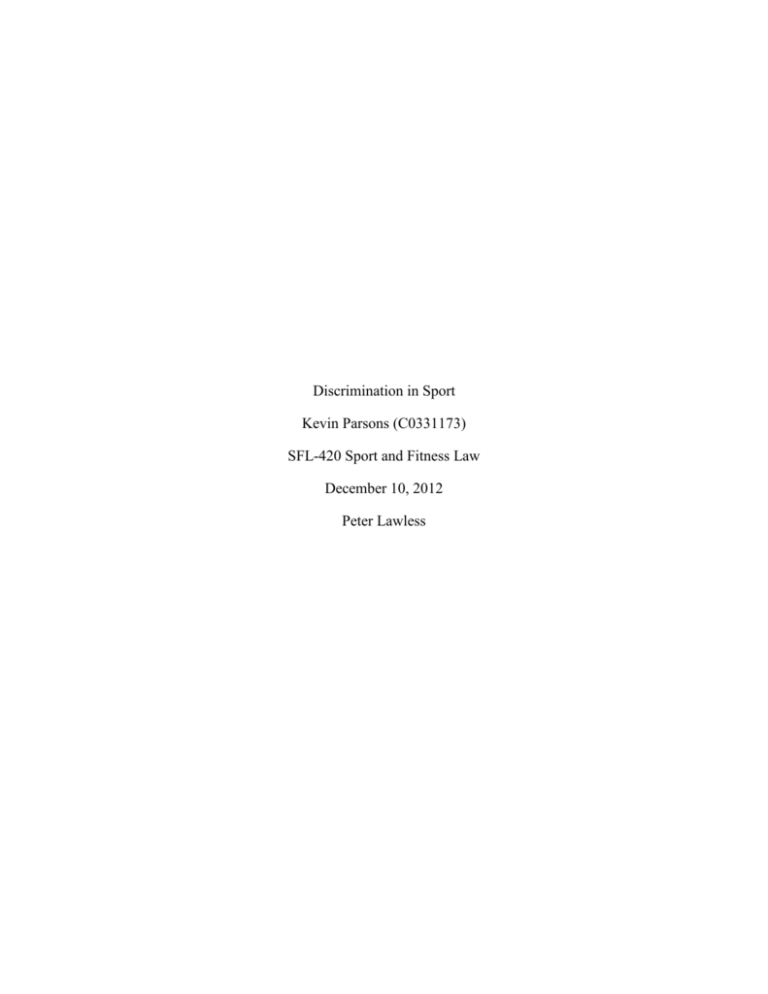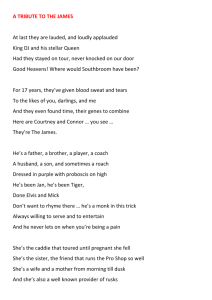
Discrimination in Sport
Kevin Parsons (C0331173)
SFL-420 Sport and Fitness Law
December 10, 2012
Peter Lawless
Blainey v. Ontario Minor Hockey Association
A 12 year old girl was prevented from playing on a boys’ hockey team by the regulations of
the O.H.A. (Ontario Hockey Association). Blainey had competed with the boys’ team in
exhibition play. Blainey’s coach stated “she has the talent and physical strength to compete as a
full member of a team…although all the other members of the team are boys”. In the past the
O.H.A. has allowed girls who are 12 years or under to play on boys teams. She was ruled
ineligible because she was not male (O.H.A. Regulation 250 - every male person should be
eligible). Mother went to the Ontario Human Rights Commission but Ontario Human Rights
Commission had no jurisdiction to receive such a complaint, Mrs. Blainey then went to the
Ontario courts.
The Canadian Charter of Rights and Freedoms is a binding legal document that protects the
basic human rights of all Canadians. It provides a list of the rights to which all Canadians are
entitled and describes the Government’s responsibility in upholding those rights. The Charter is
often cited in legal cases pertaining to human rights issues, and guarantees that our laws and the
justice system operate in accordance with fundamental rights and freedoms. he Canadian Charter
of Rights and Freedoms prohibits discrimination on the grounds of race; national or ethnic
origin; colour; religion; gender; age; and mental or physical disability. Sexual orientation has
recently been recognized as a prohibited ground for discrimination under the Charter. The
Charter protects you from discrimination in actions taken by the Government of Canada, the
government of any province or territory, and actions taken by government agencies, such as
hospitals, schools, or Human Resource Centres. O.H.A. is not a government entity – so the
Charter does not apply. “Section 1 of the Human Rights Code, extends to every person the right
to equal treatment with respect to services and facilities without discrimination…one of the
grounds of discrimination specifically prohibited is discrimination by reason of sex”. Section
19(2)“the right under section 1 to equal treatment with respect to services and facilities is not
infringed where membership in an athletic organization or participation in an athletic activity is
restricted to persons of the same sex”, direct discrimination “refers to the direct and usually
intentional differential treatment of another person, or group of persons, characterized by a
prohibited ground”. Blainey argues that s. 19(2) of the Code is contrary to s. 15(1) of the
Canadian Charter of Rights and Freedoms.
But for s. 19(2), Blainey would have been entitled to the protection of the Human Rights Code,
Section 19(2) states that sexual discrimination is permitted and is therefore clearly
discriminatory. “There is no evidence that males are being denied the right to full membership
and participation in athletic organizations, thus, s. 19(2) results also in adverse effect
discrimination on females.” The O.H.A. “has failed to show that the means chosen are
‘reasonable and demonstrably justified’ and ‘impair as little as possible the right or freedom in
question.’” “Even assuming that s. 19(2) of the Human Rights Code is inconsistent with s. 15(1)
of the Charter…it should nevertheless still stand because it is not severable from the rest of the
Human rights Code.”
PGA Tour Inc. v. Martin
PGA Tour Inc. sponsors professional golf tournaments conducts three annual tours; PGA,
Tour, NIKE Tour, and the Senior PGA Tour. A player gains entry into the tours by successfully
competing in a three-stage qualifying tournament known as Q-School. Any member of the public
may enter the Q-School by submitting two letters of recommendation & paying a $3,000.00 entry
fee to cover green fees & the cost of golf carts. The rules governing competition in PGA Tour
events include: “Rules of Golf”, which apply to all levels of amateur and professional golf;
“Conditions of Competition & Local Rules”; and “Notice to Competitors.” Use of golf carts
within Q-School is permitted at Stage 1 and Stage 2, but has been prohibited since 1997 at Stage
3. Martin is a talented golfer afflicted with a degenerative disorder (Klippel-Trenaunay-Weber
Syndrome) this disorder, prevents him from walking an 18 hole course along with;
pain/fatigue/anxiety, atrophied his right leg, and walking creates risk of haemorrhaging/blood
clots/fracturing his tibia. This has be recognized as a disability under the Americans with
Disabilities Act of 1990 (ADA), 42 U.S.C. As an Amateur, Martin won 17 Oregon Golf
Association junior events before he was 15 years old, he won the state championship as a high
school senior as well as the 1994 NCAA championship at Stanford University. As a professional
Martin qualified for the NIKE TOUR 1998 & 1999 and qualified for the 2000 PGA TOUR.
During his college career: Stanford made written requests to Pacific Conference & NCAA to
waive golf cart restrictions this request was granted. When Martin entered the Q-School, he
made a request, supported by detailed medical records, for permission to use a golf cart during
the third stage. The PGA Tour, Inc. refused to review Martin’s medical records or remove the
walking rule for the third stage of Q-School, Martin sued the PGA Tour, Inc. under the ADA
(Americans with Disabilities Act). A preliminary injunction was granted to allow the use of a
cart for Q-School & NIKE/PGA Tour, the PGA appealed this decision.
Two questions arise in concern with the application of the ADA to an athlete: whether the
Act protects access to professional golf tournaments by a qualified entrant with a disability, and
whether disabled contestants may be denied the use of a golf cart because it would
“fundamentally alter the nature” of the tournaments, to allow him to ride when other contestants
must walk. The PGA says that allowing Martin a cart would fundamentally alter the nature of the
competition. In District Court, PGA argued that the play areas of its tour competitions do not
constitute places of “public accommodation,” PGA also argues various ways on how Martin does
not fall under the jurisdiction of Title III but Title I. ADA forbids discrimination against disabled
individuals in major areas of public life: Employment (Title I), Public Services (Title II), and
Public Accommodation (Title III). Title III, requires an entity operating “public
accommodations” to make “reasonable modifications” in its policies “when... necessary to afford
such... accommodations to individuals with disabilities, unless the entity can demonstrate that
making such modifications would fundamentally alter the nature of such... accommodations.”
Title I, PGA argues that Martin is an employee and part of the entertainment business.
The purpose of the rule (cart restrictions) is to inject fatigue into the skill of shot making, but
the fatigue injected “by walking the course cannot be deemed significant under normal
circumstances.” Even with use of a cart, Martin would still walk over a mile and suffer from
fatigue much greater than an able body. Martin is covered under Title III of the ADA. Martin is
allowed to participate in competition in which he otherwise could not due to his disability, the
fact that users of a facility are highly selected does not mean the facility cannot be a public
accommodation, golf courses remain places of public accommodation during PGA tournaments.
Petitioner “leases” and “operates” golf course to conduct its Q-School and tours, must not
discriminate against any “individual” in the “full and equal enjoyment of goods, services,
facilities, privileges, advantages, or accommodation” of those courses. Human Rights
Legislation, upon accepting that “public” an “organization may not discriminate against any
member in any of its programming or operations”, using a cart does NOT “fundamentally alter
the nature of the game.”
Youth Bowling Council of Ontario v. McLeod
This case looks at “how far an organized sport must go in altering the rules of the game itself
in order to accommodate handicapped persons.” McLeod is a young girl with cerebral palsy who
uses a wooden ramp to bowl. She qualified as one of 12 children from her local area to compete
in the zone tournament. She was then ruled ineligible because of her ramp. The Canadian Five
Pin Bowlers’ Association (CFPBA) rules challenged are under the Ontario Human Rights Code.
Written objective of the CFPBA to aid handicapped bowlers, in contrast the ABC allowed
‘special equipment’ to aid in delivering the ball. The CFPBA adopted rules almost identical to
ABC’s however CFPBA still refused to allow aids, an example of indirect discrimination. There
exists and eexemption for adults with disabilities to use aids but not children. Tests showed
McLeod did not gain an unfair advantage from the use of her ramp. The Board found that “the
requirement of manual delivery of the ball was not a reasonable one”, the outcome would be
unaffected by a rule change. McLeod tried to argue a BFQ – bona fide qualification. CFPBA
argued that McLeod “could not perform the essential element of bowling, namely, manual
release”. HRC stated “there was a duty on the Council to seek reasonable means to
accommodate a handicapped person, even one who cannot perform an essential element”. The
Council did not face undue hardship. Those offering a sports service must take reasonable steps
to accommodate those whom the rules of the game would prevent from participating”. McLeod
allowed to participate, the bowling Association required to create new rules, as well as, damages
paid to McLeod.








